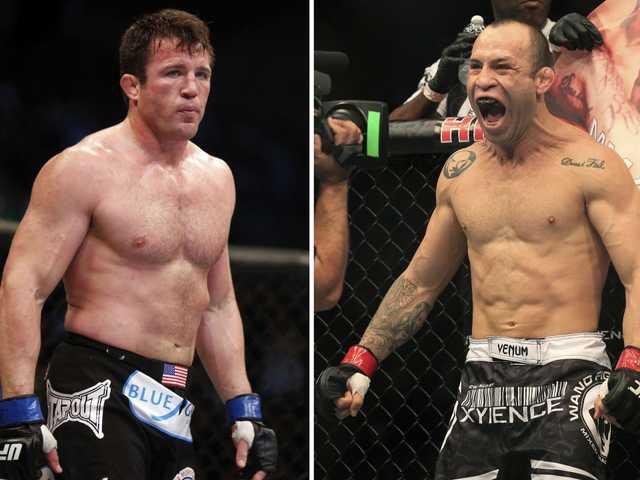Wanderlei Silva skipped a pair of Bellator press conferences set to promote his fight at Madison Square Garden. By the time he showed up for the third, he had to be separated on the stage from Chael Sonnen.
Silva and Sonnen have talked trash for years and once rumbled in street clothes on the set of a mixed martial arts reality show.
Past its due date and past their prime, Silva and Sonnen will finally meet inside the cage with more than even bragging rights at stake: Bellator, long the distant No. 2 MMA promotion in the United States, wants to prove the leap to pay-per-view on the fight game's grandest stage can help the company make a splash with combat sports fans.
"That stuff is fun," Sonnen said. "My ego is attached to that number. I look around that arena every night when I come through the curtain and I see that it's packed. I haven't had to walk out to any arena since 2008 that wasn't sold out. Believe me, it would affect me if it wasn't."
The Garden should be packed Saturday by the time Sonnen (28-15-1) and Silva (35-12-1) take the walk in the main event of the PPV card . Matt Mitrione (11-5) meets Fedor Emelianenko (36-4) in an MMA heavyweight match in the other main bout. Phil Davis (17-3) anchors the Spike TV undercard against Ryan Bader (22-5) in a light heavyweight title fight.
Bellator has hyped the show as the biggest one in its history — though it would be hard-pressed to top the Kimbo Slice bouts for sheer spectacle.
Bellator wants to stand on its own as a legitimate rival promotion but signing Sonnen, Mitrone and even broadcaster Mike Goldberg can't help at times but give the promotion a UFC-lite feel.
Bellator has plucked names fighters in the twilight of their careers and signed disgruntled ex-UFC fighters (like, say Rampage Jackson) to headline cards while trying to methodically build stars of their own on the undercard. Bellator has yet to create a star anywhere close to Conor McGregor, Ronda Rousey or Jon Jones and watched young talent such as Eddie Alvarez defect and become a UFC champion. Sonnen, though, said the gap between the companies was closing, especially with some of UFC's biggest stars sitting out the summer and others grumbling over pay and lost sponsorship revenue.
"Guys come over because they're bitter, I've seen a little bit of that phenomenon," Sonnen said. "Roy Nelson was one of those guys. He was bitter. I never fully found out why, but he just was. He's not now. He's so pumped and positive to be here. Rory MacDonald's another one. He can't open his mouth now without saying how happy he is and how glad he is he made the change."
The major disparity comes on the revenue model, where UFC has made major bank on monthly pay-per-views and Bellator is largely a ratings-based TV show on Spike. Bellator will broadcast on pay-per-view for only the second time in promotional history, signaling another step in its growth as a rival for the industry-leading UFC. Bellator staged its only previous pay-per-view event in May 2014, shortly before CEO Scott Coker took over the promotion.
With New York's MMA ban lifted, UFC stacked its debut card at MSG last fall with three title fights that set a promotion and arena gate record with $17.7 million.
Bellator certainly won't match the big box office numbers of a rival promotion that just sold for $4 billion. But Bellator's 2017 surge has led to a wave of interest and few seats unsold.
Sonnen might talk his way into a Garden sellout.
Sonnen's career suffered a serious road block when he flunked three drug tests in five years that forced him to announce his retirement and cost him a broadcasting job with Fox. He rebounded with a gig at ESPN and ended a 3 1/2-year layoff with his Bellator debut against Tito Ortiz in January. Ortiz choked out Sonnen in just 2:03 of the first round, sending the self-proclaimed "American gangster from West Linn, Oregon" to his fourth loss in five bouts.
"I was so disgusted," Sonnen said.
The 40-year-old Sonnen said he's clean and made changes in lifestyle that have him feel as strong as he did when he beat Michael Bisping in 2012.
"I haven't felt this good in about five years," Sonnen said. "We changed some stuff up with training, with diet. I made a lot of changes in my life. I've always been a very disciplined guy. I didn't know there was much room for much change or harder work or more discipline. But I found them."
Sonnen hasn't put a timetable on the end of his career, which started in 1997, and said a win coupled with rejuvenated training could extend him for at least a few more years.
Sonnen might have a headline fight or two left on pay-per-view. Even with this leap into the more lucrative world of pay-per-view fights, Coker doesn't intend to stage regular pay-per-view shows every few weeks, instead following the boxing model of using pay-per-view for only the biggest events.
"We wanted to bring the biggest, the best fight card that we could bring to New York," Coker said. "Now we have done that."
Bellator set for PPV splash with biggest card at the Garden





